Tag Archive: vocabulary selection
July 30, 2018
by Carole Zangari -
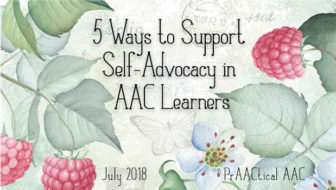
self-ad·vo·ca·cy: self ˈadvəkəsē/ Noun: the action of representing oneself or one’s views or interests. —————————- Empowering AAC learners to advocate for themselves may be one of the most important and impactful things that we can do to help them stay safe and achieve their goals. Here are some ways we can support that process. Provide messages for self-advocacy behaviors: It’s hard to represent your own interests without the appropriate set of vocabulary and messages. Words and prestored messages for protesting and rejecting are essential (e.g., No; Stop; No, thank you; I don’t want to). In addition, consider adding messages which allow the communicator to express disagreement or negative opinions (e.g., I don’t like it; I don’t think so; That doesn’t work for me; This is unfair; That’s disrespectful) and proactively provide self-advocacy information (e.g., Please do what I asked; It’s on my IEP; I have a right to be heard; I... [Read More...]
Filed under: Featured Posts, PrAACtical Thinking
Tagged With: advocacy, self-advocacy, vocabulary selection
July 6, 2017
by Carole Zangari -
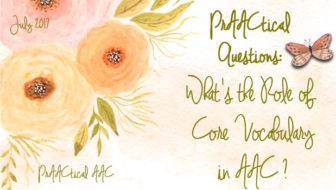
Today, we’re welcoming back Vicki Clarke, a Georgia-based SLP who has been specializing in AAC for over 25 years. Her practice, Dynamic Therapy Associates, serves children and adults with significant communication challenges in clinical and educational settings. Most of Vicki’s guest posts have been on the topic of assessment (click here to view them), but in this post, she shares her thoughts on the role of core vocabulary in AAC systems. :::::::::::::::::::::::::::::::::::::::::::::::::::::::::::::::::::::::::::::::: I’ve enjoyed listening to the wonderful presenters at the AAC In The Cloud sessions last week. It’s exciting to see AAC knowledge being shared to such a wide and varied audience! Core vocabulary was a hot topic last week so I thought it would be a good time to chat about it! At conferences, in blogs, all over the internet and from your AAC specialists, you may have gotten the memo that Core Vocabulary is an important component... [Read More...]
Filed under: Featured Posts, PrAACtical Thinking
Tagged With: core vocabulary, vocabulary selection
March 29, 2017
by Carole Zangari -

Ensuring that AAC systems include high frequency words sets the stage for us to teach language that is flexible and functional across a variety of settings. For whom is that appropriate? How many words? Which ones? In today’s featured video, master clinician Gail Van Tatenhove tackles all of these issues and more. This video and the accompanying resources (which can be found here) were part of the Power AAC series Gail created for PaATTAN to support their efforts in building capacity for high quality AAC services. We’re indebted to them for making this available so all can learn from it.
Filed under: Video of the Week
Tagged With: core vocabulary, PaTTAN, vocabulary selection
June 16, 2015
by Carole Zangari -
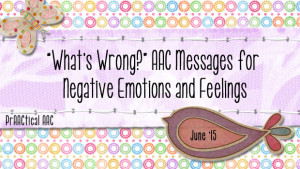
Pain. Fear. Anger. Frustration Parents and teachers frequently ask SLPs to help learners further develop the skill of being able to say what is troubling them. Those are skills worth developing, of course. But a first step may be to review the vocabulary and messages available to the learner and consider making some adjustments. It is fine to be able to say what is wrong, but it’s even better to be able to explain what happened and what kind of help you might need. Here are some ideas for messages to consider. Sadness Because…[I remembered a sad thing that happened; Something happened to me; I’m lonely; I miss someone; I was left out; Someone got hurt. Something else.] It would help if…[add student’s preferred solution strategies Anger Because…[Something bad happened; I want to do something else; Someone hurt me; It’s unfair; I’m not sure why; Something else.] I need…[Some time... [Read More...]
Filed under: PrAACtical Thinking
Tagged With: emotion, feeling, vocabulary selection
November 30, 2014
by Carole Zangari -

Vocabulary selection is a huge responsibility. In this video, we learn about the issues surrounding this important task and discover some strategies for approaching it. Thanks to Dr. Rae Sonnenmeir for her work in this series. You can see some of the other posts here and here.
Filed under: Video of the Week
Tagged With: Rae Sonnenmeir, vocabulary selection
July 2, 2014
by Carole Zangari -
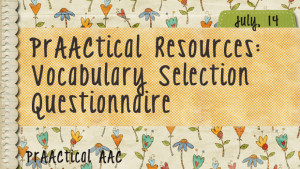
One of our prAACtical friends will be getting an AAC device soon, so it got us thinking about customizing the SGD with vocabulary that he will want to learn and use. Core words are central, for most people who use AAC, but we always want to include the words that help them express very specific and personal experiences. There are several checklists and questionnaires floating around that can help identify the fringe vocabulary. Here are two of our favorites. Young children: AAC Team at Penn State University. School-aged Students: Lauren Enders and Laurie McGowan Do you have a vocabulary selection checklist or form that you like to use? We’d love to hear about it.
Filed under: PrAACtical Thinking
Tagged With: form, resource, vocabulary checklist, vocabulary selection
September 19, 2013
by Carole Zangari -
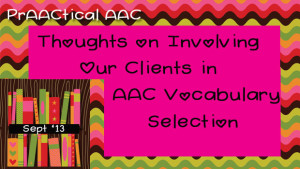
Would you want someone else to pick the car you drive? How happy would you be if someone else selected your wardrobe? How would it feel if the only things you could say were based on words that someone else decided were appropriate for you? Choosing vocabulary is a BIG responsibility. When the client is not fully literate, he/she is constrained to communicating with the words we provide and nothing more. If we left out important concepts, he’s stuck. If we worded the message in a style/tone that doesn’t fit her personality, she’ll be reluctant to use the AAC to communicate. Given this, it makes sense to involve the client in the process of choosing the single words, phrases, sentences, and narratives that we put on the AAC device or in the communication book. If the client is involved, then the messages we end up with are more likely to... [Read More...]
Filed under: PrAACtical Thinking
Tagged With: vocabulary selection
May 29, 2013
by Carole Zangari -
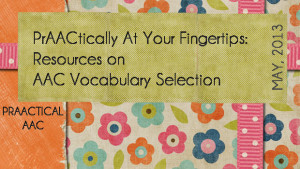
Need information on selecting vocabulary for someone with AAC needs? You can’t go wrong with Lauren Enders’ Pinterest board on this topic. She’s collected some wonderful posts, documents, and videos. Check it out here.
Filed under: PrAACtical Thinking
Tagged With: Lauren Enders, Pinterest, resources, vocabulary selection
April 16, 2013
by Carole Zangari -
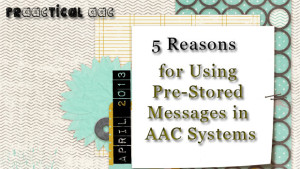
Although we are deeply invested in AAC systems that have a robust set of core language, that doesn’t mean we insist that our clients generate sentences word-by-word all the time. There are lots of good reasons for pre-storing longer messages. Here are some of them. Emergency messages: When we’re communicating about things like spasms, seizures, pain, medication, fear, and danger, time is of the essence. The quicker, the better. Examples: “My asthma is kicking up. Get my puffer, please.” “I’m having a back spasm. Take me out of my chair.” “I think my sugar is off. Can you do a finger prick to check my levels?” “I’m scared. Can you help me?” Partner instructions and communication transaction messages: Sometimes we communicate about communicating. In AAC, it’s not uncommon for someone to set the stage for how the interaction will proceed or provide their partner with specific directions. When communicating to... [Read More...]
Filed under: PrAACtical Thinking
Tagged With: pre-stored messages, vocabulary, vocabulary selection
February 14, 2013
by Carole Zangari -
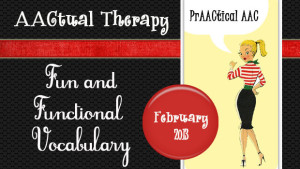
We are delighted to have Shareka Bentham back to share another post about the AACtual therapy she provides to little ones in Barbados. Last month, we followed her along to the zoo where her little friends got to generalize the language skills developed in therapy sessions. In this post, Shareka discusses her approach to something we all struggle with: selecting vocabulary that will both fun and functional. One of my biggest challenges in AAC is choosing good vocabulary targets, and working on vocabulary instruction for early communicators. By ‘good’ I mean targets which are functional for their everyday settings, representative, and most of all fun for children who are not only beginning communicators, but also beginning AAC users. I have become the AAC ‘specialist’ at a school for children with complex communication needs, so I generally have to cater to the communicative needs of children from the pre-communication to... [Read More...]
Filed under: PrAACtical Thinking
Tagged With: AACtual therapy, Shareka Bentham, vocabulary selection









